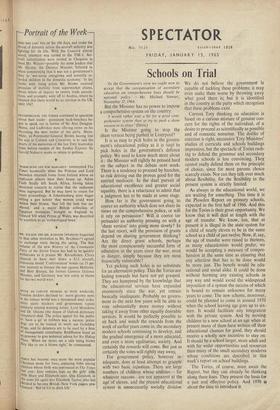Schools 011 Trial
'In the Government's view we ought now to accept that the reorganisation of secondary education on comprehensive lines should be national policy.' — Mr. Michael Stewart, November 27, 1964.
But the Minister has no power to impose a comprehensive system on the country.
'I would rather wait a bit for a good com- prehensive System than to try to push a sham version in its place.' (Ditto.) Is the Minister going to stop the sham version being pushed in Liverpool?
It is as easy to pick holes in the govern- ment's educational policy as it is (say) to pick holes in the government's defence policy. We need to know much more about it: the Minister will rightly be pressed hard on the subject in the debate next week: There is a tendency to proceed by hunches, to risk driving out the proven good for the untried mediocre. In the dual pursuit of educational excellence and greater social equality, there is a reluctance to admit that a judgment has to be made at some stage.
How far is the government going to coerce an authority which does not share its views on the comprehensive policy, or will it rely on persuasion? Will it coerce (or persuade) an authority pressing on with a `sham version' into going more slowly? In the last resort, will the provision of grants depend on sharing government thinking? Are the direct grant schools, perhaps the most conspicuously successful form of education in the years since the war, most in danger, simply because they are most financially vulnerable?
Yet picking such holes is no substitute for an alternative policy. This the Tories are feeling towards but have not yet grasped. They are hampered by the knowledge that the educational services have expanded enormously since the war, yet remain basically inadequate. • Probably no govern- ment in the next few years will be able to vote substantially more money without taking it away from other equally desirable services. It would be perfectly possible to sit back and watch the rewards from the work of earlier years come in, the secondary modern schools continuing to develop, and the gradual emergence of a more educated, and even a more egalitarian, society. And certainly the rewards will come. But just as certainly the votes will rightly stay away, For government policy, however in- adequate, does at least attempt to grapple with two basic injustices. There are large numbers of children whose abilities for whatever reasons—are not apparent at the age of 'eleven, and the present' educational system is unnecessarily socially divisive. We do not believe the government is capable of tackling these problems; it may even make them worse by throwing away what good there is; but it is identified in the country as the party which recognises that these problems exist.
Current Tory thinking on education' is based on a curious mixture of genuine con- cern for the rights of the individual, of a desire to proceed as scientifically as possible and of romantic nonsense: The dislike of coercion is right, successiVe Tory Ministers' studies of curricula and schools buildings impressive, but the spectacle of Tories rush- ing to defend the grammar and secondary modern schools is less convincing. They, cannot really defend them on the principle of choice, since for most parents choice scarcely exists. Nor can they talk over much about flexibility, for the flexibility in the present system is strictly limited.
As always in the educational world, we are waiting for something. This time it is the Plowden Report on primary schools. expected in the first half of 1966. And this for the Tories is their great opportunity. We know that it will deal at length with the age of transfer. We know, too, that at present it is illegal in the state system for a child of nearly eleven to be in the same school as a child of just twelve. Now, if, say, the age of transfer were raised to thirteen, as many educationists would prefer, we would be accepting a measure of compre- hension at, the same time as ensuring that any selection that has to be done would be more just. The benefit would be edu- cational and social alike. It could be done without harming any existing schools in any way and would avoid the widespread imposition of a system the success of which is bound to remain unknown for many years to come. The new scheme, moreover,. could be planned to come in around 1970 when the school leaving age goes up to six- teen. It would facilitate any integration with the private system. And by moving children to a new school at an age when at present many of them have written off their educational chances for good, they should receive a wholly new incentive to stay on.
It should be a school larger, more adult and with far wider opportunities and resources than many of the small secondary moderns whose conditions are described in this week's report on school buildings.
The Tories, of course, must await the Report, but they can already be thinking along these lines. They present the basis for a just and effective policy. And 1970 is about the time to introduce it.






























 Previous page
Previous page